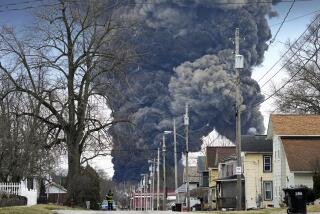Eager Investors Buy Conrail Stock, Drive Up Price : Biggest-Ever Initial Public Sale Brings $1.65 Billion to U.S.
- Share via
NEW YORK — Capping a remarkable turnaround, the Conrail freight railroad was sold to eager investors Thursday in what was both the largest initial public stock offering and the largest sale of government property in U.S. history.
Shares in the railroad, which was pieced together from seven bankrupt Northeastern rail lines in 1976, were priced at $28 a share but jumped to $31.50 at the opening of trading. They drifted down later to close at $30.75 a share in trading on the New York and Philadelphia stock exchanges.
The sale of the 59 million shares--85% of the total--brought the government gross revenue of $1.65 billion, and represented “the maximum possible return for the American public,” according to Transportation Secretary Elizabeth Hanford Dole. She appeared briefly on the trading floor of the New York Stock Exchange to be photographed in a railroad engineer’s cap and to give an enthusiastic hug to Stanley Crane, Conrail’s chief executive.
Dole, who long favored sale of Conrail to a private company rather than a public offering, said in a prepared statement that the offering should “break the ground for more privatizations.”
Achievement by Management
The remaining 15% stake in the railroad is owned by an employee stock ownership plan, won by its workers in exchange for concessions on work rules and wages. About 6.8 million shares of the 59 million total were sold abroad.
Though the government has sunk billions of dollars into the 14,000-mile railroad since it was created, its continued viability has been considered a considerable achievement for its managers. The Philadelphia-based company, formally the Consolidated Rail Corp., has improved its track and other assets, trimmed its work force to 35,000 from 100,000 and generally used deregulation and marketing skill to make itself competitive with such rivals as CSX Corp. and the Norfolk Southern Railway.
Its management, headed by Crane, a former Southern Railway chief executive, is considered by some to be the best in the industry.
Yet many investors, citing the slow growth of the railroad industry, harbor doubts about the railroad’s long-term prospects. Some analysts and investment managers said Thursday that the stock’s quick rise may reflect the modest pricing of the offer and investor enthusiasm at the success of “privatizations” in other countries more than optimism about Conrail’s future.
Successes Abroad
The British government, for example, succeeded surprisingly with the sale of British Airways, British Telecommunications and British Gas as part of Prime Minister Margaret Thatcher’s privatization drives. The Japanese government and the conservative regime of French Premier Jacques Chirac have also surprised some with the success of their public stock offerings for government properties.
One securities trader, who asked to remain unidentified, said he believes that the Conrail stock was priced slightly low in an effort to increase investors’ appetite for the shares and to make the sale look better to the public. “I think they might have priced it a tad low,” he said. “There’s been so much hype about this over the past few months that if demand wasn’t strong it would have been, if not a flop, at least disappointing.”
Officials of Goldman, Sachs, the lead underwriter of the six big investment houses that managed the offering, did not return phone calls seeking comment.
Dole had long opposed a public sale of the railroad, urging instead that it be sold to competitor Norfolk Southern for $1.2 billion. But many in Congress objected to the move as anti-competitive, predicting higher freight rates and the layoff of thousands of the company’s employees.
An analyst for one large pension fund said the public’s eagerness for the stock may also reflect an expectation that the company will diversify from the railroad business into faster-growing enterprises, such as trucking or energy. In just such a diversification move by a railroad company, Union Pacific last fall purchased Overnight Transportation, a large trucking firm.
ALthough Conrail has been profitable since 1980, the analyst noted, its health has been partly due to the tax breaks it has received as a government enterprise. And the company’s revenue has fallen 10% since 1981.
HISTORIC OFFERINGS The 10 biggest initial public offerings in corporate history. List includes shares sold outside the United States and foreign offerings sold primarily in this country. Data based on report from IDD Information Service.
Consolidated Rail $1.65 billion Henley Group $1.3 billion Duff & Phelps Selected Utilities (closed-end mutual fund) $1.2 billion Coca-Cola Enterprises $1.2 billion MFS Multimarket Income Trust (closed-end mutual fund) $1.1 billion Fireman’s Fund $824 million Commercial Credit $779 million First Australian Prime Fund (closed-end mutual fund) $750 million Rockefeller Center Properties $750 million Ford Motor Co. $658 million
Source: Associated Press
More to Read
Sign up for Essential California
The most important California stories and recommendations in your inbox every morning.
You may occasionally receive promotional content from the Los Angeles Times.











